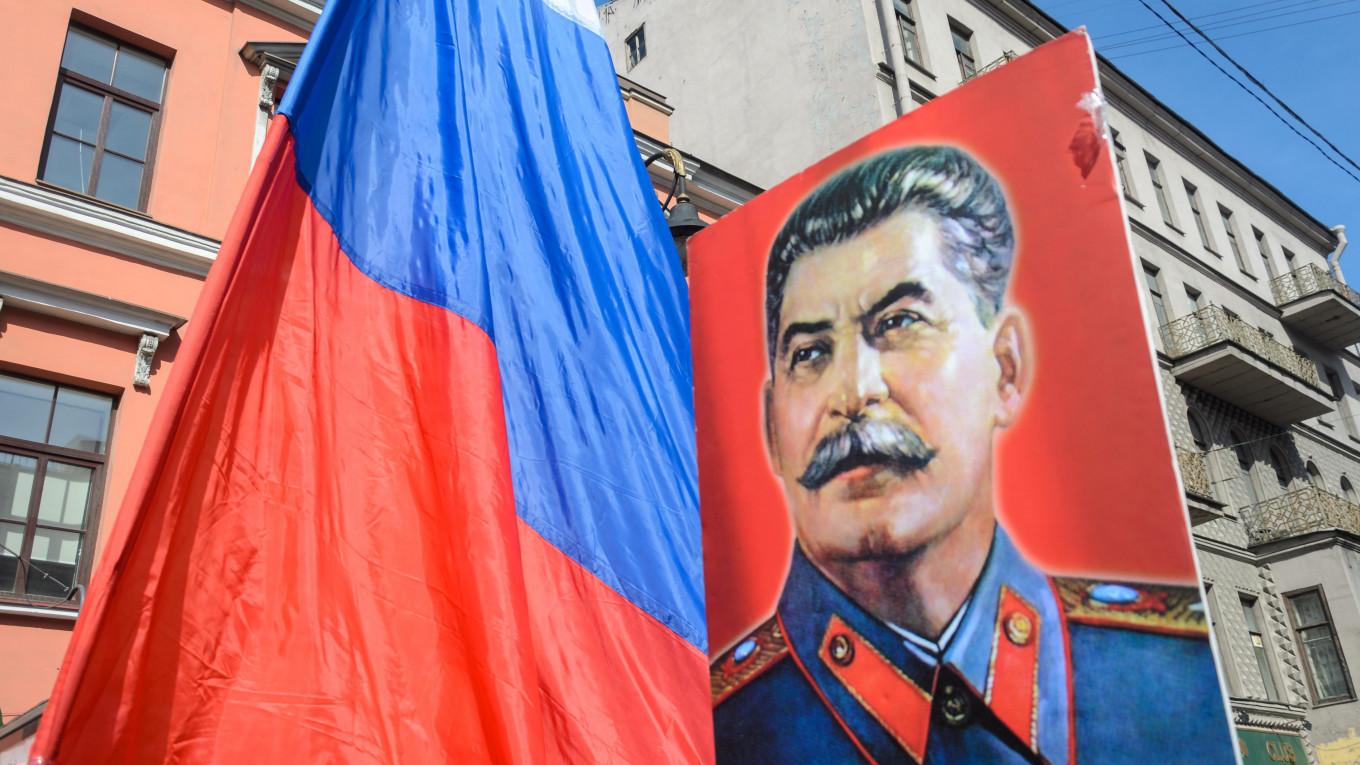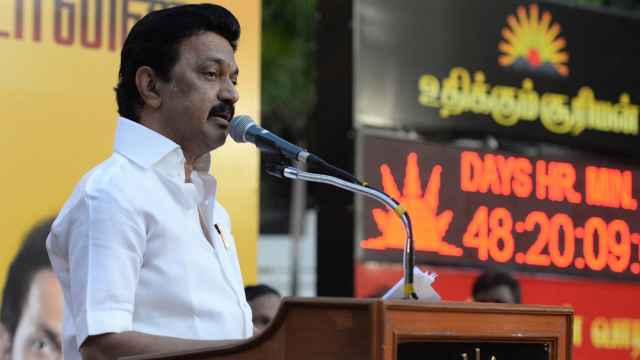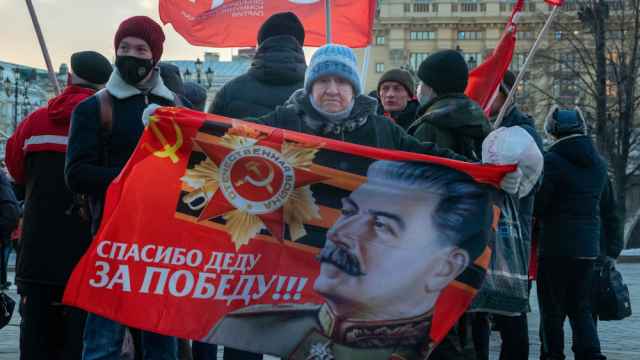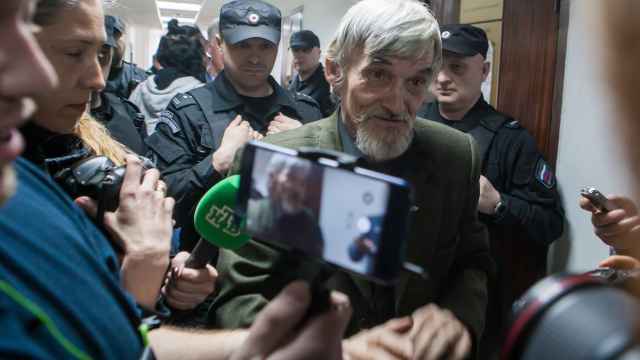Today’s Russia doesn’t have the concentration camps or mass repressions we associate with Stalin’s regime. But cruelty and bloodshed weren’t the only defining characteristics of Stalin’s system. There were others too, and their reemergence under President Vladimir Putin suggests that Stalinism is resurging.
Citizen as Resource
Like the pharaos who commissioned the Egyptian pyramids, Communist leaders, viewed people only as a resource, an expendable commodity. They did not concern themselves with their citizens’ quality of life.
Living conditions are much more pleasant in Russia today than they were in the Soviet era. But this isn’t an achievement of the state. It is a consequence of the fact that despite the vulnerable and conditional status of private property the Russian economy primarily functions as a market economy.
With its militaristic budget, which sacrifices the welfare, even the lives of its citizens in the name of ambition and ruling class interests, the regime clearly demonstrates that now as in Stalin’s time, the people are its last concern. Its top priorities are chimeras of grandeur, of absolute sovereignty, and of its own security.
Control Over Emotions
All states control citizens’ behavior to a degree, from requiring them to stop at red lights to punishing them for cooperating with foreign intelligence services. The communist system, however, sought to control not only behavior — in the broadest sense of the word, to include clothing style and hair length — but also emotions, which were expected to conform to the party line.
Today, the new, non-communist state dictates what its citizens should be proud of and what and how they should mourn. Russia has faced a barrage of repressive laws that mostly target emotions the authorities don’t approve of. Actual laws are reinforced with informal social control.
There are many subjects on which it is difficult and even psychologically dangerous to offer an opinion that differs from the “correct” one. An atmosphere of fear is creeping back in.
Enemies all around
Russia’s “besieged fortress” ideology is not new. But under Stalin it had an ideological basis: “Imperialists hate us because we represent world revolution and liberation of the oppressed.”
In the post-revolutionary years, Soviet leaders really seemed to think that this sentiment would sooner or later compel Western countries to attack.
Today’s “besieged fortress” mentality is more dangerous than the Soviet one. The state is trying to convince its citizens that foreigners hate Russia simply for what it is and for the good it is trying to bring to an ungrateful world.
Instead of branding the ruling classes of capitalist countries as enemies, as was the case under Stalin, the current regime is denouncing entire nations— Britain, Georgia and Poland.
The Russian government’s unfounded claim that foreigners inherently hate Russia makes people think that a new world war is either inevitable or could be averted by building up arms and strengthening the military. In this context, even questioning the quality of medical services becomes unpatriotic.
Anti-Intellectualism
Stalin did not conceal his contempt for intellect and education. When he referred to Nikolai Bukharin, a Bolshevik leader he would later order killed, as “our scholar,” he was calling him an enemy.
Russia’s current regime is naturally inclined to reach out to “old school” Russians for support, such as Orthodox Christians or the workers of obsolete and inefficient enterprises. The authorities view intellectuals with caution at best, and they treat their “habitats,” i.e., leading universities and research institutes, with undisguised hostility.
Autocracy v. Law
Under Stalin, the Soviet Union’s laws bore almost no relation to reality. Everything was at the mercy of the leader and his deputies. This was absolute power taken to the extreme.
Today, laws and the constitution are, again, mostly decorative. This is not just because the courts and law enforcement are corrupt. It is because the desires of the regime and Putin are more important than legal procedures.
Subjects of the law in Russia voluntarily give up their rights. It is impossible to imagine the State Duma rejecting draft legislation submitted by the president. Individual deputies might privately express their dissatisfaction with a bill, but they will still vote in favor of it along with all of their colleagues.
Meanwhile, the Federation Council has not only unanimously authorized the president to use the Armed Forces abroad without restrictions on duration or territory, but it has done so without even discussing the initiative.
The parliament voted to approve Putin’s request to use military force in Syria without asking the president’s representative a single question. Sure, the level of absolute power is still far from Stalin’s, but things are quickly moving in that direction.
Illusion v. Reality
The Stalinist system was based on lies. Both the past and the present were distorted. Industrial and agricultural production indicators, combat losses, and demographic data were all classified. Anyone who tried to disclose the real state of affairs was repressed. The government gave the people figures that it considered to be the right figures to give.
Modern technologies and a fundamentally different societal structure make it difficult to lie quite so brazenly. Nevertheless, Russia’s current regime takes advantage of its monopoly over television airtime to revise Russia’s past using mythology that benefits it, fabricating a moral authority for the nation and inventing successes for the so-called “Russian world” that don’t actually exist.
The regime makes its citizens forget the promises it gave them. It blames foreign and domestic enemies for its failures while attributing any successes to the personal involvement and wisdom of one man, President Putin. The extent to which reality is twisted is already close to where it was under Stalin.
Repressive System
The repressive system was fundamental to Stalin’s regime. Going forward, its role gradually became limited to its more direct purview.
In recent years, we have seen a resurgence of the repressive system. New structures, like the National Guard, are being established, and existing structures receive generous funding.
Individuals who do not hail from the security services are seen in positions of power less frequently. There is a genuine discussion of “presumption of legitimacy” for all law enforcement officials’ actions. Effectively, they have long been immune to claims of cruelty and abuse of authority.
What’s Next?
The Stalinist system was not only criminal and amoral, but also costly and inefficient. Following a series of erratic and inconsistent attempts at reforming itself, the system created by Stalin collapsed.
The growing prominence of Stalinist traits in today’s system makes it difficult to be optimistic about the future.
The modern-day Russian state lacks mechanisms for development. It has distanced itself from the progressive segment of society and even become antagonistic to this sector. It depends on the will and well-being of a single individual. It could very well suffer the same fate that befell the regime on whose ruins it was built.
Leonid Gozman is a Russian opposition politician and former co-chair of the Pravoye Delo political party. He holds a PhD in psychology.
An earlier version of this article first appeared in the Russian edition of Forbes magazine.
The views and opinions expressed in opinion pieces do not necessarily reflect the position of The Moscow Times.
A Message from The Moscow Times:
Dear readers,
We are facing unprecedented challenges. Russia's Prosecutor General's Office has designated The Moscow Times as an "undesirable" organization, criminalizing our work and putting our staff at risk of prosecution. This follows our earlier unjust labeling as a "foreign agent."
These actions are direct attempts to silence independent journalism in Russia. The authorities claim our work "discredits the decisions of the Russian leadership." We see things differently: we strive to provide accurate, unbiased reporting on Russia.
We, the journalists of The Moscow Times, refuse to be silenced. But to continue our work, we need your help.
Your support, no matter how small, makes a world of difference. If you can, please support us monthly starting from just $2. It's quick to set up, and every contribution makes a significant impact.
By supporting The Moscow Times, you're defending open, independent journalism in the face of repression. Thank you for standing with us.
Remind me later.








